
Your Recovery
LEEP removes tissue from the cervix. Your procedure removed abnormal tissue from your cervix.
You may have mild cramping for several hours after the procedure. A dark brown vaginal discharge during the first week is normal. You can use a sanitary pad for the bleeding.
You may also have some spotting for about 3 weeks. How long it takes to recover will depend on how much was done during the procedure.
This care sheet gives you a general idea about how long it will take for you to recover. But each person recovers at a different pace. Follow the steps below to feel better as quickly as possible.
How can you care for yourself at home?
 Activity
Activity
- You can probably return to your normal routine in about a week. How long it takes you to recover will depend on how much was done.
- Try to walk each day. You can resume regular exercise when you are feeling better.
 Medicines
Medicines
- Your doctor will tell you if and when you can restart your medicines. The doctor will also give you instructions about taking any new medicines.
- If you stopped taking aspirin or some other blood thinner, your doctor will tell you when to start taking it again.
- Take an over-the-counter pain medicine, such as acetaminophen (Tylenol), ibuprofen (Advil, Motrin), or naproxen (Aleve). Read and follow all instructions on the label.
- Do not take two or more pain medicines at the same time unless the doctor told you to. Many pain medicines have acetaminophen, which is Tylenol. Too much acetaminophen (Tylenol) can be harmful.
 Other instructions
Other instructions
- Use a sanitary pad if you have bleeding.
- Do not have vaginal sex or place anything in your vagina for 2 to 4 weeks after the procedure or until your doctor tells you it is okay. Do not douche.
- You can take a shower anytime after the procedure. Ask your doctor when it is okay to take a bath.
- Depending on the biopsy results, you will have regular follow-up HPV tests, Pap tests, or colposcopic exams. Your doctor will tell you what follow-up tests you should have and when you need to have them done.
Follow-up care is a key part of your treatment and safety. Be sure to make and go to all appointments, and call your doctor if you are having problems. It's also a good idea to know your test results and keep a list of the medicines you take.
When should you call for help?
Call 911 anytime you think you may need emergency care. For example, call if:
- You passed out (lost consciousness).
- You have chest pain, are short of breath, or cough up blood.
Call your doctor now or seek immediate medical care if:
- You have pain that does not get better after you take pain medicine.
- You cannot pass stools or gas.
- You have signs of infection, such as:
- Increased pain, swelling, warmth, or redness.
- A fever.
- You have bright red vaginal bleeding that soaks one or more pads in an hour.
- You have vaginal discharge that has increased in amount or smells bad.
- You are sick to your stomach or cannot drink fluids.
- You have signs of a blood clot in your leg (called a deep vein thrombosis), such as:
- Pain in your calf, back of the knee, thigh, or groin.
- Redness or swelling in your leg.
Watch closely for any changes in your health, and be sure to contact your doctor if you have any problems.
Where can you learn more?
Go to http://www.healthwise.net/patientEd
Enter Y487 in the search box to learn more about "Loop Electrosurgical Excision Procedure (LEEP): What to Expect at Home".
Current as of: April 30, 2024
Author: Ignite Healthwise, LLC Staff
Clinical Review Board
All Ignite Healthwise, LLC education is reviewed by a team that includes physicians, nurses, advanced practitioners, registered dieticians, and other healthcare professionals.

